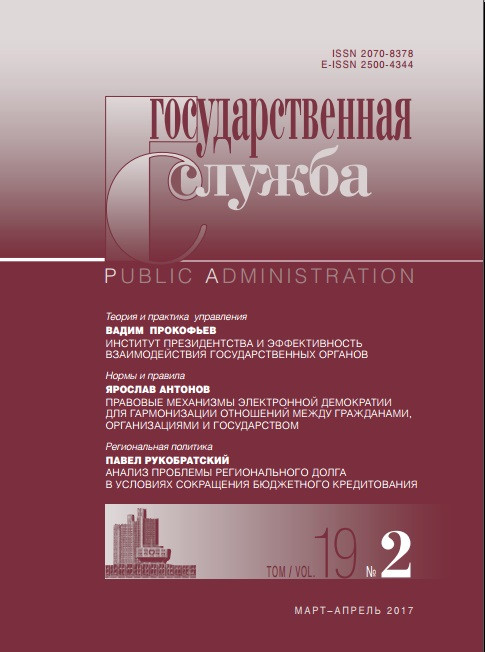Рекомендуемая ссылка на статью:
Норайр Мигранович Акиляна
аРоссийская академия народного хозяйства и государственной службы при Президенте Российской Федерации
DOI: 10.22394/2070-8378-2017-19-2-86-88
Аннотация:
В статье проанализирована роль института Уполномоченного по правам человека в процессе формирования правовой культуры народа, являющейся одной из важных, но в то же время слабо реализованных задач российского государства. Раскрыт комплекс мер, направленный государством на повышение правовой культуры народа, воспитание в демократическом духе подрастающего поколения, развитие творческого потенциала нации. Отмечено, что в области правового просвещения народа Уполномоченный занимает ключевое место. Его деятельность направлена на повышение осведомленности общества о своих правах и свободах, гарантированных законодательством, а также механизмах защиты и восстановления нарушенных прав и свобод. Аргументирована необходимость усиления и централизации аппарата Уполномоченного, что должно способствовать более масштабному осуществлению этим органом правозащитной политики государства для повышения правовой культуры народа. Для реализации этих задач предложено создание обширной сети постоянных приемных Уполномоченного во всех регионах и субъектах Российской Федерации. Предложены теоретические и практические механизмы по усовершенствованию института Уполномоченного по правам человека в Российской Федерации в системе формирования у граждан правовой культуры как основы и правовой гарантии защиты и охраны прав, свобод человека и гражданина. Автор делает вывод о том, что Уполномоченный по правам человека, назначаемый на должность Государственной Думой Российской Федерации и являющийся, как правило, авторитетным деятелем правозащитного движения в своей стране, не обладает, однако, никакими конкретными публично-властными полномочиями. Тем не менее, это не мешает этому государственному деятелю эффективно реагировать на случаи нарушения прав человека в Российской Федерации.
Abstract:
The article examines the role of the Commissioner for Human Rights in the process of formation of legal culture of population, being the most important and at the same time poorly implemented goal of the Russian state. A set of measures aimed at enhancing the legal culture of the population by the state, the education of the younger generation in the spirit of democracy, development of creative potential of the nation is considered. The Commissioner is noted to be central to the field of the legal education of the population. Its activities are aimed at the improvement of the awareness of the society about its rights and freedoms guaranteed by the law, as well as the mechanisms of defense and restoration of infringed rights and freedoms. The necessity of strengthening and centralizing of the Commissioner’s office that are to facilitate the larger implementation of the human rights policies of the state in order to enhance the legal culture of the population is substantiated. For implementation of these goals it is offered to create the extensive network of the permanent presence chambers of the Commissioner in all regions and constituent entities of the Russian Federation. The theoretical and practical mechanisms are offered for improving the institution of the Commissioner for Human Rights in the Russian Federation in the system of formation of citizens‘ legal culture as the basis and legal guarantee of protection of rights and freedoms of man and citizen. The author concludes that the Commissioner for Human Rights appointed to the position by the State Duma of the Russian Federation and being, as a rule, an authoritative figure of the human rights movement in his or her country, does not possess, however, any specific public-authoritative powers. Nevertheless, it doesn’t prevent this public official from reacting effectively on cases of human rights violation in the Russian Federation.
Ключевые слова:
права человека, институт Уполномоченного по правам человека, правовая культура, правовые гарантии
Keywords:
human rights, institution of the Commissioner for Human Rights, legal culture, legal guarantees
Литература:
Конджакулян К.М. Акилян Н.М. Уполномоченный по правам человека в Российской Федерации и Защитник в Республике Армения в системе органов государственной власти // Закон и право. № 12. 2015.
Мамитова Н.В. Правосознание современного российского общества: теоретико-правовой анализ // Развитие юридической науки в новых условиях: единство теории и практики / сборник тезисов по материалам международной научно-практической конференции, посвященной 100-летию со дня основания Южного федерального университета. Ростов-на-Дону: Издательство. 2015 (a).
Мамитова Н.В. Арктическая зона Российской Федерации: проблемы развития и правового регулирования // СПб.: Санкт-Петербургский университет ГПС МЧС России. 2015 (b).
Gammeltoft-Hansen H. The Introduction and Development of the Swedish JustitieOmbudsman in Denmark: The IOI Stockholm 2009 Conference Papers, Back to Roots: Tracing the Swedish Origin of Ombudsman Institutions, Friday, 2014.
Gøtze M. & Rytter J. Monism or Dualism in Administrative Law, 2013. European Review of Public Law 12, no. 2, 2015.
Green, Mark & Eisner, Laurel. The Public Advocate for New York City: An Analysis of the County’s Only Elected ombudsman, New York Times, October 17, 2012.
References:
Kondzhakulyan K.M. Akilyan N.M. Upolnomochennyj po pravam cheloveka v Rossijskoj Federacii i Zashhitnik v Respublike Armenija v sisteme organov gosudarstvennoj vlasti [Human-rights commissioner in the Russian Federation and Defender in the Republic of Armenia in the system of the state government bodies] In: Zakon i pravo. № 12. 2015. In Russian.
Mamitova N.V. Pravosoznanie sovremennogo rossijskogo obshhestva: teoretiko-pravovoj analiz. In: Razvitie juridicheskoj nauki v novyh uslovijah: edinstvo teorii i praktiki/sbornik tezisov po materialam mezhdunarodnoj nauchno-prakticheskoj konferencii, posvjashhennoj 100-letiju so dnja osnovanija Juzhnogo federal’nogo universiteta. [Legal consciousness of a modern Russian society: theoretical-legal analysis. In: Development of the legal science in the new conditions: unity of the theory and practice / collection of theses for the materials of the international scientific-practical conference, dedicated to the 100th anniversary from the date of the foundation of the Southern Federal University] Rostov-na-Donu: Izdatel’stvo. 2015 (a) In Russian.
Mamitova N.V. Arkticheskaja zona Rossijskoj Federacii: problemy razvitija i pravovogo regulirovanija [Arctic zone of the Russian Federation: the issues of development and legal regulation]. SPb.: Sankt-Peterburgskij universitet GPS MChS Rossii. 2015 (b) In Russian.
Статьи в режиме Open Access публикуются в соответствии с лицензией Creative Commons Attribution 4.0 International (CC BY).

